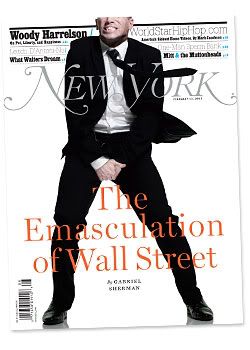
That's the cover of the latest New York Magazine with the cover story by Gabriel Sherman. It's long, but an absolute must-read.
The crash four years ago was shocking enough to the financial class. But what is happening on Wall Street now is even more terrifying. No doubt the economy itself—the crisis in Europe, the effects of the tsunami in Japan, America’s sputtering recovery—has played a large part in the financial industry’s struggles. But even the most stubborn economies improve eventually. The bigger issues are structural. The Dodd-Frank financial-reform act, much maligned, has already begun to change the shape of the financial system—even before a number of its major provisions are proposed to go into full effect this coming July...
A few years ago, the Masters of the Universe never could have imagined their industry being compared to big-box retailing. And yet, the model that had fueled bank profits has finally broken, as markets sputtered and new regulation kicked in. “Compensation is never really going to come back,” a Wall Street headhunter told me. “That is something entirely new.”
What is even more startling about this reversal is that few thought the much-vilified Dodd-Frank act would have much effect at all. From the moment it was proposed in 2009, the bill was tarred from all sides. Critics from the left, who wanted a return of Glass-Steagall, which had kept investments banks and commercial banks separate until it was repealed during the Clinton years, howled that Dodd-Frank wouldn’t go far enough to break up the too-big-to-fail banks... The too-big-to-fail banks, for their part, argued that the 2,300-page bill would create an overly complex morass of overlapping regulators that risked killing their ability to compete against foreign rivals...
By the time the bill passed, in July 2010, the legislation hadn’t found many new friends. Banks were especially upset by the inclusion of the Volcker Rule, which banned proprietary trading and virtually all hedge-fund investing by banks. Banks also complained about an amendment that slashed lucrative debit-card fees. They capitulated mainly because the alternative—breaking them up—was worse.
Part of the perception that the financial crisis changed nothing is that, in the immediate wake of the crash, the banks, buoyed by bailout dollars, whipsawed back to profitability. Goldman earned a record profit of $13.4 billion in 2009, as markets roared back from their post-Lehman lows. This dead-cat bounce was central to the formation of Occupy Wall Street and the neopopulist political currents that first erupted when the Treasury Department appointed Ken Feinberg to regulate bonuses for several TARP recipients...
And yet, from the moment Dodd-Frank passed, the banks’ financial results have tended to slide downward, in significant part because of measures taken in anticipation of its future effect. Since July 2010, Bank of America nosed down 42 percent, Morgan Stanley fell 25 percent, Goldman fell 21 percent, and Citigroup fell 16—in a period when the Dow rose 25 percent. Partly, this is a function of the economic headwinds. But the bill’s major provisions—forcing banks to reduce leverage, imposing a ban on proprietary trading, making derivatives markets more transparent, and ending abusive debit-card practices—have taken a pickax to the Wall Street business model even though the act won’t be completely in effect till the Volcker Rule kicks in this July (other aspects of the bill took force in December; capital requirements and many other elements of the bill will be phased in gradually between now and 2016). “If you landed on Earth from Mars and looked at the banks, you’d see that these are institutions that need to build up capital and that they’re becoming lower-margin businesses,” a senior banker told me. “So that means it will be hard, nearly impossible, to sustain their size and compensation structure.” In the past year, the financial industry has laid off some 200,000 workers.
Here's yet another example in our polarized politics where the real story of progressive reform is not being told because both left and right extremists have such trouble actually recognizing success. But thanks to President Obama and Congressional Democrats, Wall Street is being reformed without taking the entire US economy down with it.




No comments:
Post a Comment